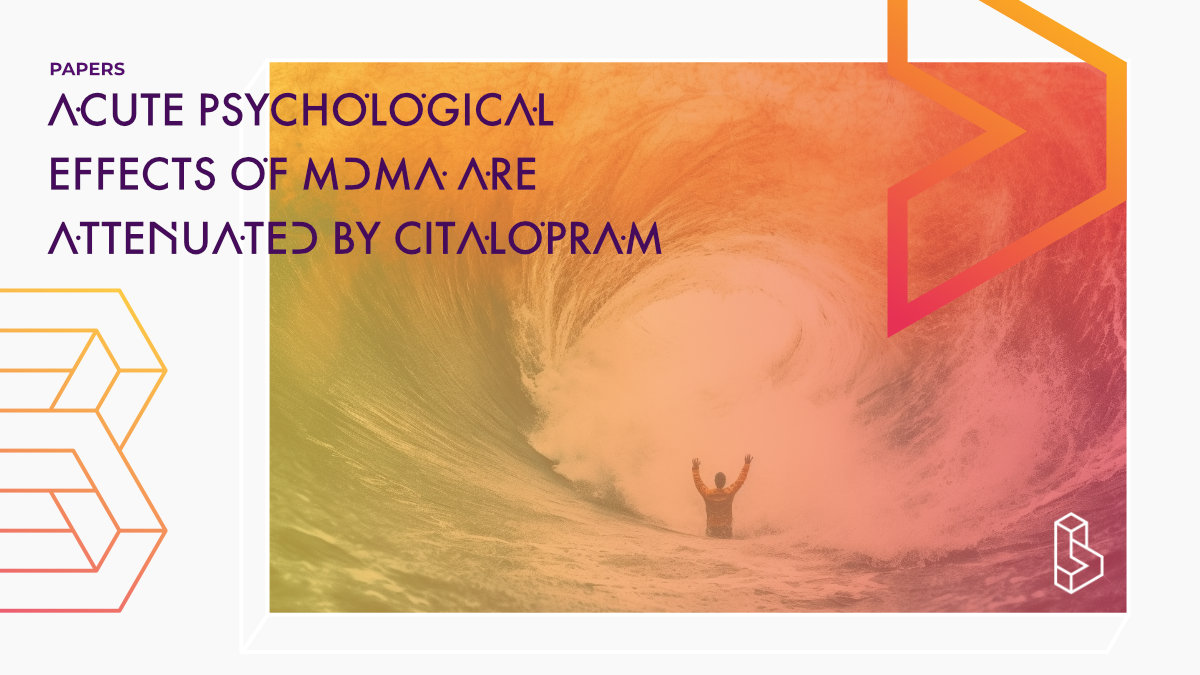This study (n=16) found that the psychological effect of MDMA (105mg/70kg) was markedly reduced by the conventional antidepressant citalopram, suggesting that MDMA activity is associated with the 5-HT uptake site.
Abstract of Acute psychological effects of MDMA are attenuated by citalopram
“3,4-Methylenedioxymethamphetamine (MDMA, “Ecstasy”) is a recreational drug that has been shown to release serotonin (5-HT) and dopamine (DA) in animals. The effect of MDMA on 5-HT release can be blocked by 5-HT uptake inhibitors such as citalopram, suggesting that MDMA interacts with the 5-HT uptake site. It is unknown whether this mechanism is also responsible for the psychological effects of MDMA in humans. We investigated the effect of citalopram pretreatment (40 mg iv) on the psychological effects of MDMA (1.5 mg/kg po) in a double-blind placebo-controlled psychometric study in 16 healthy human volunteers. MDMA produced an emotional state with heightened mood, increased self-confidence and extroversion, moderate derealization, and an intensification of sensory perception. Most of these effects were markedly reduced by citalopram. This finding suggests that the psychological effects of MDMA are mediated via action at the 5-HT uptake site to increase 5-HT release through the carrier, as expected from animal studies.”
Authors: Matthias E. Liechti, Christine Baumann, Alex Gamma & Franz X. Vollenweider
Summary of Acute psychological effects of MDMA are attenuated by citalopram
MDMA, “Ecstasy”, is an amphetamine derivative that produces feelings of well-being and euphoria, moderate derealization, depersonalization, cognitive disturbances, and heightened sensory awareness. It is unknown whether this mechanism of action is also responsible for the psychological effects of MDMA in humans.
The researchers reported that four Ecstasy users who had taken fluoxetine before Ecstasy felt no change in subjective experience compared to Ecstasy alone. The researchers hypothesized that citalopram would reduce the psychological effects of MDMA in healthy human subjects.
Find this paper
https://doi.org/10.1016/S0893-133X(99)00148-7
Open Access | Google Scholar | Backup | 🕊
Cite this paper (APA)
Liechti, M. E., Baumann, C., Gamma, A., & Vollenweider, F. X. (2000). Acute psychological effects of 3, 4-methylenedioxymethamphetamine (MDMA,“Ecstasy”) are attenuated by the serotonin uptake inhibitor citalopram. Neuropsychopharmacology, 22(5), 513-521.
Study details
Compounds studied
MDMA
Topics studied
Neuroscience
Study characteristics
Original
Placebo-Controlled
Double-Blind
Within-Subject
Theory Building
Bio/Neuro
Participants
16
Humans
Authors
Authors associated with this publication with profiles on Blossom
Matthias LiechtiMatthias Emanuel Liechti is the research group leader at the Liechti Lab at the University of Basel.
Franz Vollenweider
Franz X. Vollenweider is one of the pioneering psychedelics researchers, currently at the University of Zurich. He is also the director of the Heffter (sponsored) Research Center Zürich for Consciousness Studies (HRC-ZH).
Institutes
Institutes associated with this publication
University of ZurichWithin the Department of Psychiatry, Psychotherapy and Psychosomatics at the University of Zurich, Dr Mialn Scheidegger is leading team conducting psychedelic research and therapy development.
Compound Details
The psychedelics given at which dose and how many times
MDMA 105 mg | 1x
